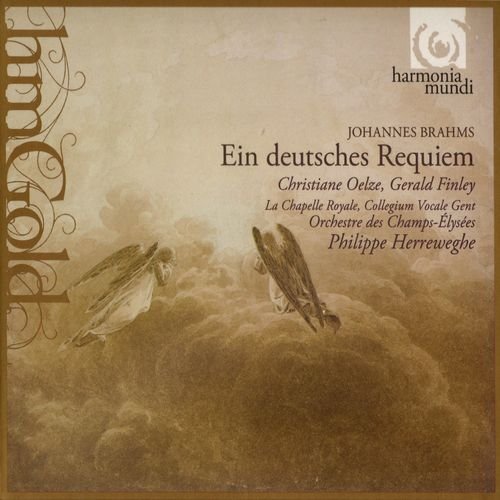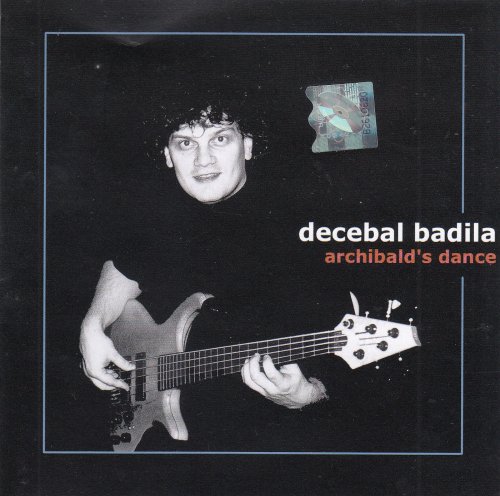Philippe Herreweghe - Brahms: Ein Deutsches Requiem (2008)

Artist: Philippe Herreweghe
Title: Brahms: Ein Deutsches Requiem
Year Of Release: 2008
Label: Harmonia Mundi
Genre: Classical
Quality: FLAC (image+.cue,log,scans)
Total Time: 66:15
Total Size: 298 Mb
WebSite: Album Preview
Tracklist: Title: Brahms: Ein Deutsches Requiem
Year Of Release: 2008
Label: Harmonia Mundi
Genre: Classical
Quality: FLAC (image+.cue,log,scans)
Total Time: 66:15
Total Size: 298 Mb
WebSite: Album Preview
1. Selig sind, die da leid tragen 10:18
2. Denn alles Fleisch, es ist wie Gras 13:54
3. Herr, lehre doch mich, daß ein Ende mit mir haben muß 9:28
4. Wie lieblich sind deine Wohnungen, Herr Zebaoth 5:03
5. Ihr habt nut Traurigkeit 6:52
6. Denn wir haben hie keine bleibende Statt 11:12
7. Selig sind die Toten, die in dem Herren sterben 9:24
Performers:
Christiane Oelze - soprano
Gerald Finley - baritone
La Chapelle Royale
Collegium Vocale Gent
Orchestre des Champs-Élysées
Philippe Herreweghe
This is a rather brisk reading of Brahms' masterpiece, the most ambitious work in his output and one of the greatest compositions of its type. Though Herreweghe's tempos often pushed the music to its limits here (except for the first section), the performance never actually sounded fast, or at least not offensively fast. In fact, it challenges the Levine/RCA effort.
Funny, but both recordings are rather opposites: Levine's is weighty and glorious, where Herreweghe's is ecstatic and animated. The former has the better soloists in Kathleen Battle and Håkan Hagegård, and the better supporting forces in the Chicago Symphony Orchestra & Chorus, advantages that would seem to tilt the scales in favor of the RCA. But those seeming pluses can be deceptive. In fact, Herreweghe may actually have a superior interpretation, perhaps hitting closer to the spirit of the Requiem as Brahms conceived it: the composer's work aims toward the human side of the issue, depicting mourning, all right, but offering consolation instead of expressing the grimness of the Last Judgment. Try Herreweghe's positively rapturous ending of the third section, starting from around 7:00. Levine here goes slower and is convincing in his way. Both offer good opening sections (Selig sind), although here it is Herreweghe who goes slower, and to good effect.
In the end, this Harmonia Mundi Brahms Requiem is thoroughly compelling and suffers from no weaknesses: if the soloists are not as good as Levine's, they're not much inferior, either, and they certainly convey the requisite drama, religiosity, humanity, and sorrow with total conviction. On the evidence here, Finley should be better known. Oelze's contribution isn't to be overlooked, either, but she comes up short when compared with Battle. The choral and orchestral support on this Harmonia Mundi release are first-rate. The notes are informative and full texts are provided; sound reproduction is superb. In sum, this is a major effort by all parties involved and takes its place among the most distinguished Brahms Requiems.
Funny, but both recordings are rather opposites: Levine's is weighty and glorious, where Herreweghe's is ecstatic and animated. The former has the better soloists in Kathleen Battle and Håkan Hagegård, and the better supporting forces in the Chicago Symphony Orchestra & Chorus, advantages that would seem to tilt the scales in favor of the RCA. But those seeming pluses can be deceptive. In fact, Herreweghe may actually have a superior interpretation, perhaps hitting closer to the spirit of the Requiem as Brahms conceived it: the composer's work aims toward the human side of the issue, depicting mourning, all right, but offering consolation instead of expressing the grimness of the Last Judgment. Try Herreweghe's positively rapturous ending of the third section, starting from around 7:00. Levine here goes slower and is convincing in his way. Both offer good opening sections (Selig sind), although here it is Herreweghe who goes slower, and to good effect.
In the end, this Harmonia Mundi Brahms Requiem is thoroughly compelling and suffers from no weaknesses: if the soloists are not as good as Levine's, they're not much inferior, either, and they certainly convey the requisite drama, religiosity, humanity, and sorrow with total conviction. On the evidence here, Finley should be better known. Oelze's contribution isn't to be overlooked, either, but she comes up short when compared with Battle. The choral and orchestral support on this Harmonia Mundi release are first-rate. The notes are informative and full texts are provided; sound reproduction is superb. In sum, this is a major effort by all parties involved and takes its place among the most distinguished Brahms Requiems.

![Tomasz Zyrmont Quartet - London Manifest (2026) [Hi-Res] Tomasz Zyrmont Quartet - London Manifest (2026) [Hi-Res]](https://www.dibpic.com/uploads/posts/2026-01/1769077156_img-20260102-wa0002.jpg)






